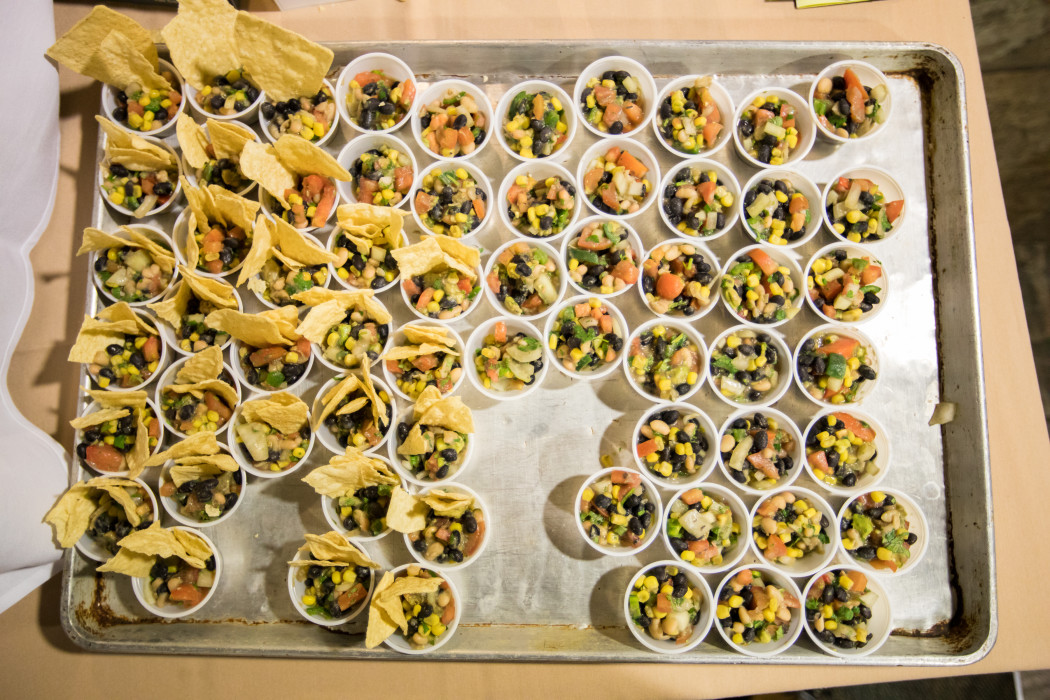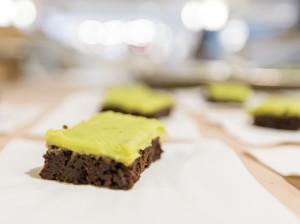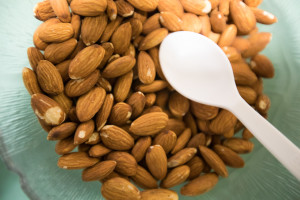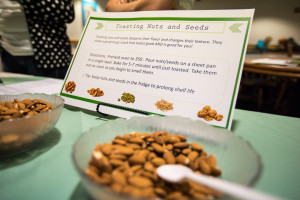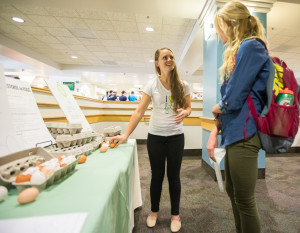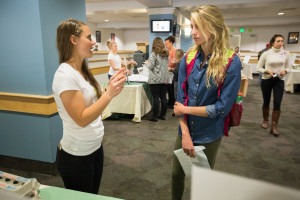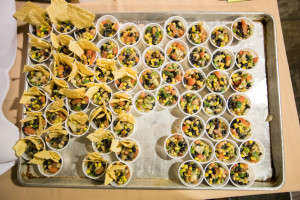USU’s dietetics students debunk ‘fat phobia’ at annual Food Day event
Is guacamole slowly expanding America’s waistlines, one $1.50 scoop at a time? Does drinking full-fat milk really make you gain weight? And precisely how much dark chocolate is too much dark chocolate?
These questions are all linked to what Utah State University’s nutrition, dietetics and food science (NDFS) students call “fat phobia,” the fear of fat and all things delicious that strikes the hearts of honest gym-going, kale-worshipping Americans at the mere mention of extra cheese or milk that isn’t skim.
This year, NDFS students set out to debunk these myths and calm the fears of fat-phobic students at their annual Food Day, which took place Thursday at the Taggart Student Center.
Attendees explored booths where patient soon-to-be professionals explained the ins and outs of consuming fat in a healthy, responsible and yummy way. Students sampled nutrient-packed flax seed balls, gooey brownies with an avocado-based frosting and a cost-effective, skinny-jean-friendly beef stew.
“There are a lot of misconceptions about fat,” said Sheryl Aguilar, a professional practice assistant professor in the NDFS program. “So we thought that would be a perfect theme this year.”
Aguilar explained that fat can be a difficult concept to understand because most people are taught to think of fats as “good” (like avocados) or “bad” (like extra cheese on your pizza). But fat can’t really be defined that way.
In fact, Aguilar said there aren’t many “bad” fats, but that doesn’t mean it’s healthy to get extra-extra cheese on a pizza or that it’s okay to eat quesaritos four nights a week.
“But most fats are going to be very valuable in your diet,” Aguilar said.
Addy Bedke, a senior studying dietetics who helped coordinate the event, said NDFS students took into account the unique needs of college students in their planning.
“This is basically to learn about fat and be able to eat fat as a college student,” Bedke said.
Bedke said she and other students tried several versions of a recipe before it was given the Food Day OK. They wanted to make sure recipes were college-friendly – so they weren’t very expensive, didn’t require dirtying a lot of dishes and used only a few ingredients.
“Let’s take the flax seed balls. All it is is just a few ingredients – you dump, dump, dump, you mix it together, you roll it into a ball,” Bedke said. “It’s not only easy but also has really good, whole ingredients that are really packed with nutrients and are really good for you.”
Sarah Kapp, another senior who planned the event, said she thought students were responding well to the information presenters had to offer.
“We’re getting the word out about what’s kind of healthier or unhealthier, what to buy and how to incorporate it into your diet,” Kapp said.
Drew Stophlet, a senior studying engineering, said even though his girlfriend is a dietetics student who keeps him informed about healthy food, he still learned something new at Food Day.
“If I knew nothing and walked through here, I would’ve learned a lot,” Stophlet said.
Junior and industrial hygiene major Dustin Nellesen said he learned incorporating fat into a healthy diet could be simple.
“There’s a lot of simple stuff that I guess we kind of glance over because we’re so accustomed to one thing,” Nellesen said. “A simple change is a healthy change.”
Other students agreed that while they’d learned new things at Food Day, changing their diets would have more to do with budget than with health – at least at this point in their lives.
Sophomore Camiel Bruneel said she’d think about changing her diet, “if it’s cheap.”
Oaklee Anderson, a freshman, said she’d “need to learn a little more first.”
NDFS students hope to be able to track the impact of Food Day – and any dietary changes students might have made – with a new system of follow-up surveys. Previous Food Day events at USU required students to take a survey within an hour or so of the event. This time, students will be surveyed again 30 days later.
Aguilar said she hopes this will help students in her dietetics research class generate more definitive data to demonstrate the impact of Food Day. She said she hopes to find out “if we’re actually able to more than just nudge attitudes, knowledge and self-efficacy but actually nudge food changes.”
It’s safe to say most students learned something new at Food Day, whether it was the cost-effectiveness of lean protein, the many reasons to love avocados or that, as freshman Isaac Jackson put it, “you can make a really good stew out of cheap meat.”
@alyssarbrts

